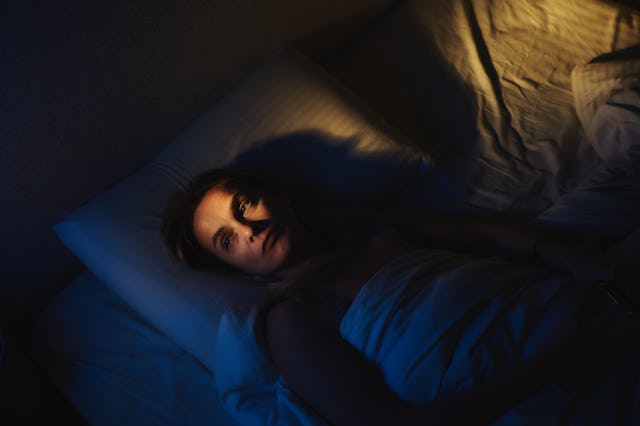Why Your Body Craves Rest But Rejects Sleep, Even When You’re Tired AF
Omg, brain — just shut off.

Nope, you’re not the only one who wakes up tired, yearns all day to take to bed like a Victorian waif, and then when you finally crawl between the covers, you simply can’t fall asleep. Why is it that your body craves rest all day long, but then when you finally get the chance, you can never seem to actually sleep... no matter how tired you feel? It’s a super frustrating feeling (which usually only makes it harder to sleep, TBH), and one that’s rooted in a big buzzword right now: overstimulation.
Trying to manage jobs, marriages, friendships, world events, and everything involved in maintaining a household and raising a whole child — it’s more than the human nervous system is designed to handle, frankly. Not only can it make us more irritable and feel like dissociating, but it can actually also impact the functions and rhythms of our bodies. Like... our Circadian rhythms.
Why is it so hard to sleep even when I feel tired all day?
This disconnect between feeling exhausted but being unable to sleep often comes “from chronic overstimulation and an overactive nervous system,” says Marisa Ronquillo, a licensed marriage and family therapist and owner of Insightful Roots Therapy. “When we’re in a heightened state of stress, the body keeps producing stress hormones even when we’re physically tired. It’s like having your foot on the gas and the brakes at the same time. When people are constantly ‘on’ — managing work, kids, notifications, endless to-dos — their nervous system doesn’t get enough downtime. This makes it hard to switch from go mode into rest mode, which is essential for sleep.”
It’s also hard to stick to healthy habits when we’re overwhelmed, says Caitlyn Oscarson, LMFT, a California-based therapist specializing in postpartum anxiety and sleep anxiety. Many parents only get time to themselves at night, and it can be hard to go to bed on time when you just want a few more minutes to think some uninterrupted thoughts (a phenomenon known as revenge sleep procrastination).
Enough nights of tossing and turning and getting frustrated can begin to condition your brain to associate the bed with stress, making it even harder to catch Zs. “Part of what keeps insomnia going is something called conditioned arousal. In the simplest terms, the body can be trained to associate alertness or stress with the bed. When this happens, you can do all the meditation and relaxation you want before bed, but when bedtime comes, the mind will be alert and activated,” says Kasryn Kapp, a licensed professional counselor specializing in sleep and insomnia.
So, if your mind kicks into high gear when your head hits the pillow, it could be an unconscious reaction your brain has learned over time. It’ll take some work to undo, but it can be done.
I feel tired all day but can’t fall asleep at night. What should I do?
If you’re suddenly having difficulty sleeping when you didn’t before, it’s worth checking in with your health care provider to ensure there’s no underlying medical cause, Kapp says. If you think you can’t sleep because you’re overstimulated, you could try signaling to your brain that you’re safe and it’s OK to relax, Ronquillo says. You could try some grounding techniques, mindful breathing, or gentle movement before bed to calm the mind. “Instead of just forcing sleep, the goal is to ease into rest by creating conditions that let the nervous system downshift.”
But if you’ve listened to all the sleep podcasts and done all the meditating you can stand, it could be that you’re conditioned to activate when you lie down to sleep. You might be thinking that you need to get really serious about sleep hygiene, like not looking at screens in the hour before bed and keeping a consistent routine and bedtime. But both Oscarson and Kapp say this can make bedtime arousal and anxiety worse.
“Sleep issues are tricky because sometimes the pressure to do all the right things for sleep makes it harder,” Oscarson says. If you’ve been researching sleep hygiene and decide to cut your screen time, make your room darker, and relax before bed, you’re already keyed up and hoping it all works, Kapp says. Staying in bed trying to fall asleep while anxious about whether your new strategies will help reinforces to your brain that bed is a place for stress.
Kapp’s advice? Get out of bed and do something enjoyable. Trying to force sleep is a losing battle, she says, and yeah, you may lose some sleep for a bit. But at least this way, you can begin to break the association between your brain, your bed, and wakefulness.
“If the challenges of sleep feel especially overwhelming, you may be experiencing anxiety or insomnia. A therapist can help you understand the cycle and build your skills to reduce the overwhelm,” adds Oscarson.